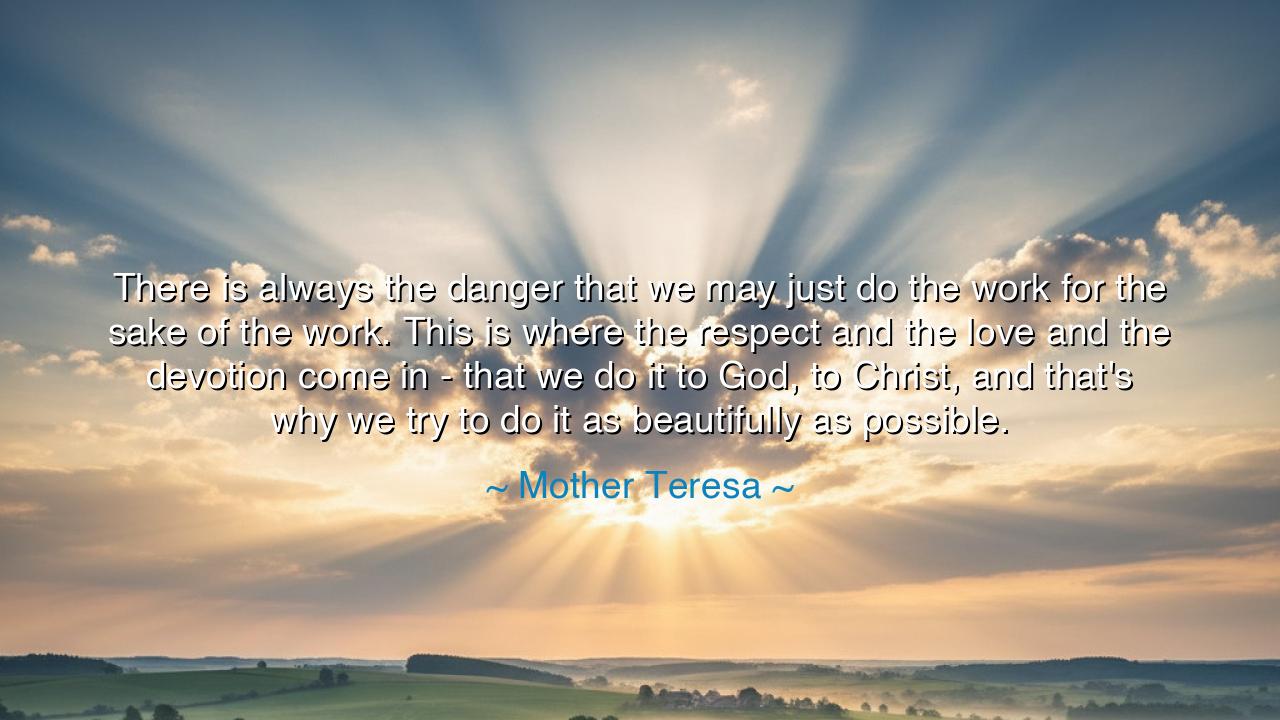
There is always the danger that we may just do the work for the
There is always the danger that we may just do the work for the sake of the work. This is where the respect and the love and the devotion come in - that we do it to God, to Christ, and that's why we try to do it as beautifully as possible.






Mother Teresa, the servant of the poorest of the poor, once declared: “There is always the danger that we may just do the work for the sake of the work. This is where the respect and the love and the devotion come in—that we do it to God, to Christ, and that's why we try to do it as beautifully as possible.” These words shine like a flame against the coldness of routine. For they remind us that labor without love becomes hollow, and service without spirit becomes empty. It is not the work itself that sanctifies, but the intention, the respect, the love, and the devotion with which it is carried out.
The origin of this wisdom comes from Mother Teresa’s daily life among the sick, the dying, and the abandoned in Calcutta. She and her sisters performed tasks that the world often scorned—washing wounds, carrying the dying from the streets, feeding the starving. Yet she warned her followers that if these acts were done merely as duty, they could become burdens. What transformed the work into something divine was the offering of it to God, the presence of love in each gesture, the sense that every poor man and woman bore the face of Christ. Thus, she called for not only labor, but beautiful labor—work imbued with reverence.
The ancients, too, knew this truth. The Stoics taught that every action, no matter how small, should be performed with excellence, as though offered to the universe itself. The Bhagavad Gita proclaims that action, when offered to God and not done for selfish reward, becomes sacred. Even in the Scriptures, Saint Paul exhorted: “Whatever you do, do it heartily, as unto the Lord.” Mother Teresa’s words stand in this great tradition: the spirit of devotion transforms ordinary tasks into eternal offerings.
Consider the story of Brother Lawrence, a humble monk of the seventeenth century. His task in the monastery was not preaching or writing, but cooking in the kitchen. Yet he declared that when he flipped a frying pan or scrubbed a pot in devotion to God, he felt as close to heaven as when kneeling in prayer. His life became a witness that it is not the grandeur of the work, but the love within it, that gives it worth. Mother Teresa lived this same truth on the streets of Calcutta, turning the washing of wounds into an act of divine beauty.
The lesson is clear: we must guard against the emptiness of routine. To work only for the sake of the work is to lose the soul of it. Whether we sweep a floor, write a book, or tend a child, the true value lies not in the task but in the devotion we bring to it. Work without love wearies the spirit; work with love renews it. Mother Teresa’s words call us to reframe every duty—not as drudgery, but as an offering to something greater than ourselves.
Practical actions follow. Begin each task, however small, with intention: ask yourself why you do it, and for whom. Infuse it with respect for those it touches, with love for the people it serves, and with devotion that lifts it beyond the ordinary. If you work with your hands, work gently, as though serving Christ Himself. If you work with your mind, think clearly, with humility and patience. And when fatigue comes, remember that beauty lies not in perfection, but in the love poured into the effort.
Thus, O listeners, take this wisdom to heart: the greatness of work lies not in its size but in its spirit. A king building a palace without love builds dust, but a servant sweeping a floor with love builds eternity. Mother Teresa reminds us that the heart is the true craftsman of beauty. Let your labor, whatever it may be, shine not with pride, but with reverence.
And remember this final truth: when work becomes worship, even the smallest act becomes infinite. To live this way is to transform the world—not through power, but through love. For love is the breath of the spirit, and devotion is its crown. Do your work beautifully, and in doing so, you honor both man and God.






AAdministratorAdministrator
Welcome, honored guests. Please leave a comment, we will respond soon